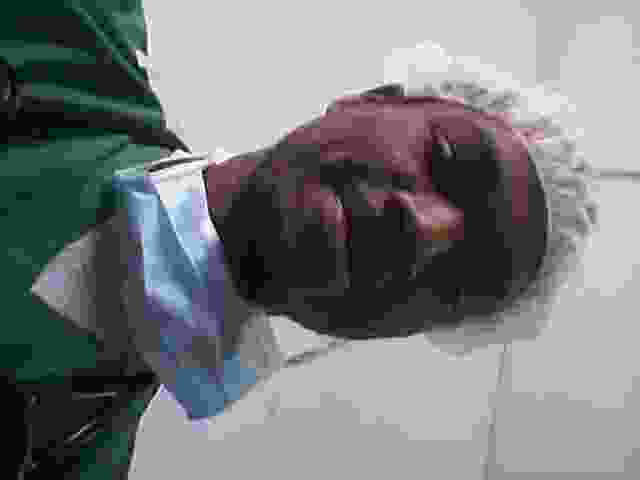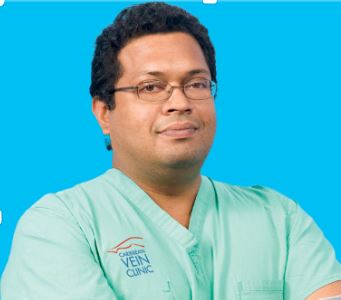- Filters 0
- Sort
Filters
Fee
Gender
Experience
Languages Spoken
4 Trusted Best Vascular Surgery Doctors available in Guyana
 Book
Appointments Quickly with Verified Doctors
Book
Appointments Quickly with Verified Doctors

GY$ 10,805.70
Dr Kymmi Caesar
- Vascular Surgery
- MBBS, BbMedsci, CWSP
- 12yr experience
-
Port of Spain
-
English

GY$ 18,524.06
Dr Adedapo Oladiran
- Vascular Surgery
- MBBS, MSc, FRCS, FACS
- 20yr experience
-
Port of Spain
-
English
Book Online Consultations with Vascular Surgery Experts
Access highly experienced Vascular Surgery doctors for professional medical guidance. Discuss your health concerns online and get expert care anytime, anywhere.
| Name | Speciality | Exp | Fee |
|---|---|---|---|
| Dr Raj Kapoor (MBBS, MD, ECFMG, ABSM, FCCP,) | Pulmonology | 50 Y | GY$ 19,870.18 |
| Dr David Toby (MBBS,FRCS) | Orthopedics | 45 Y | GY$ 15,436.71 |
| Dr E Monica Davis (MBBS,MPhil) | Physiology | 42 Y | GY$ 9,262.03 |
| Dr Rodney Benjamin (MBBS) | Anesthesiology | 41 Y | GY$ 7,718.36 |
| Dr Manohar Ahuja (M.D., M.B.B.S., M.R.C.P.(UK), Nephrology & Internal Medicine) | Nephrology | 40 Y | GY$ 16,732.79 |
| Dr Prakashbhan Persad (MBBS, DGO, FRCOG, MRCPI, MFFP, MSc (Fetal Medicine)) | Obstetrics gynecology | 37 Y | GY$ 16,980.39 |
| Dr Prakashbhan Persad (MBBS, DGO, FRCOG, MRCPI, MFFP, MSc (Fetal Medicine)) | Women health | 37 Y | GY$ 16,980.39 |
| Dr Stephen Ramroop (M.B.B.S, F.R.C.S, MBA) | Orthopedics | 35 Y | GY$ 12,349.37 |
| Dr Vernon DaCosta (MD, OBGYN) | Obstetrics gynecology | 32 Y | GY$ 17,672.58 |
| Dr Sergiy Adonin (MD (Master of Surgery), MBBS) | Orthopedics | 30 Y | GY$ 16,980.39 |
Vascular Surgery in Guyana
Vascular diseases can severely affect your quality of life, especially when left untreated. These conditions impact the blood vessels, leading to complications such as poor circulation, pain, and even organ damage. Vascular surgery is essential in managing and treating these issues, providing relief and improving overall health.
At Medicas, we offer a comprehensive approach to vascular health, including online doctor consultations and customised health checkup packages, making our services easily accessible and convenient for all patients.
What is Vascular Disease?
Vascular diseases are conditions that affect the arteries, veins, or lymphatic vessels, often resulting in restricted blood flow. Common vascular conditions include:
- Aneurysms: Swelling in the walls of blood vessels that may rupture if left untreated.
- Peripheral Artery Disease (PAD): Blocked arteries reducing blood flow to limbs.
- Critical Limb Ischemia: An advanced form of PAD causing persistent pain, ulcers, and potential tissue death.
- Varicose Veins: Enlarged, twisted veins that can cause discomfort and cosmetic concerns.
- Deep Vein Thrombosis (DVT): The formation of blood clots in deep veins, typically in the legs, that can lead to serious complications like pulmonary embolism.
- Chronic Venous Insufficiency: A condition where veins cannot efficiently pump blood back to the heart, leading to swelling, pain, and skin changes in the legs.
- Raynaud’s Disease: Causes areas like fingers and toes to become numb and cold due to temperature changes or stress.
- Carotid Artery Disease: Narrowing of the carotid arteries, reducing blood flow to the brain and increasing stroke risk.
- Buerger’s Disease: A rare disease affecting the arteries and veins in the arms and legs, leading to blockages and tissue damage.
Early detection and timely vascular surgery are crucial to prevent these conditions from worsening.
Who is at Risk for Vascular Problems?
While anyone can experience vascular issues, certain risk factors can increase your chances, including:
- Age: The risk of vascular diseases rises as you get older.
- Obesity: Being overweight places strain on blood vessels, increasing the risk of vascular complications.
- Family History: Genetic predisposition can make some individuals more vulnerable.
- Lifestyle Factors: Smoking, poor diet, and lack of exercise can damage blood vessels.
- Chronic Conditions: Diabetes, high blood pressure, and high cholesterol elevate the likelihood of vascular diseases.
- Medical History: A prior history of heart disease or stroke can increase your risk.
- Injuries or Trauma: Physical damage to blood vessels can necessitate surgical intervention.
- Alcohol Consumption: Excessive drinking can contribute to high blood pressure and other vascular issues.
- Stress: Chronic stress can cause high blood pressure, leading to vascular damage.
- Occupational Hazards: Jobs that require prolonged sitting or standing can increase the likelihood of varicose veins and other vascular problems.
Understanding these risk factors is key to early detection and preventing complications through proper care and timely treatment.
When is Surgery Necessary for Vascular Problems?
Surgery becomes necessary when other treatments such as medication, lifestyle changes, or conservative measures do not resolve the issue, or when the condition presents an immediate threat to your health. Some situations that may require vascular surgery include:
- Persistent symptoms despite medication and lifestyle changes.
- Severe cases of critical limb ischemia where there is a risk of losing a limb.
- Aneurysms that are at risk of rupturing.
- Blood clots that cause life-threatening conditions like strokes or pulmonary embolisms.
- Varicose veins causing significant pain, swelling, or ulceration.
A vascular specialist will evaluate your situation and determine if surgery, such as limb salvage surgery, is the best option.
What Types of Surgeries Are Available to Treat Vascular Diseases?
Vascular surgeries are generally classified into minimally invasive procedures and traditional open surgeries:
Minimally Invasive Procedures
These procedures require smaller incisions, leading to quicker recovery and fewer complications. They are often preferred for their efficiency and patient comfort.
- Angioplasty and Stenting: Expanding narrowed arteries using a balloon or a stent.
- Endovascular Aneurysm Repair (EVAR): Treating aneurysms without large incisions.
- Thrombolysis: Using medication to dissolve blood clots obstructing blood flow.
- Atherectomy: Removing plaque from arteries using a catheter.
Open Vascular Surgery
Open surgery involves larger incisions and is used for more complex or severe cases that require direct access to blood vessels.
- Bypass Surgery: Creating a new pathway for blood flow around a blocked artery.
- Aneurysm Repair: Reinforcing or replacing a damaged blood vessel.
- Carotid Endarterectomy: Removing plaque from the carotid arteries to reduce stroke risk.
- Femoral Endarterectomy: Removing plaque from the femoral artery to improve blood flow to the legs.
Limb Salvage Surgery
This procedure aims to save the limb in severe cases of critical limb ischemia, often involving revascularisation or tissue reconstruction.
Hybrid Procedures
In some cases, a combination of minimally invasive and open techniques may be used for optimal results. These hybrid surgeries combine the best aspects of both approaches, tailored to the patient’s needs.
The type of surgery recommended will depend on your specific condition and overall health. At Medicas, we provide expert consultations to develop a personalised treatment plan that ensures the best possible outcomes.
What Are the Risks of Vascular Surgery?
Although life-saving, vascular surgeries come with some risks, such as:
- Infection at the surgical site.
- Bleeding during or after the procedure.
- Blood clots that could lead to further complications.
- Nerve damage in the treated area.
- Reactions to anesthesia, especially in major surgeries.
- Damage to blood vessels or surrounding tissues.
- Recurrence of the condition if underlying causes are not fully addressed.
- Scarring at the incision sites.
Discuss these risks with your surgeon to understand the precautions and minimize potential complications.
What is Recovery and Follow-Up Like After Vascular Surgery?
Recovery time varies depending on the type of surgery performed and your overall health. Key aspects include:
- Hospital Stay: Minimally invasive procedures typically require shorter hospital stays than open surgeries.
- Rehabilitation: Physical therapy may be recommended to restore strength and mobility.
- Monitoring: Continuous monitoring of the surgical site to check for any complications.
- Medications: Blood thinners and pain management are commonly prescribed.
- Follow-Up: Regular check-ups via online consultations or in-person visits to monitor recovery progress.
- Lifestyle Changes: You may need to adopt a healthier lifestyle, including proper nutrition, regular exercise, and quitting smoking.
Patients who undergo procedures like limb salvage surgery often need long-term care plans that include routine vascular assessments.
How is Medicas Unique in Surgery for Vascular Problems?
At Medicas, we aim to provide top-tier vascular care tailored to your needs. Here’s what sets us apart:
- Experienced Specialists: Our team includes experts in managing complex vascular conditions, including critical limb ischemia and limb salvage surgery.
- Advanced Technology: We use the latest minimally invasive and open vascular surgery equipment to provide the best care.
- Accessibility: Our online consultations ensure you have access to care no matter where you are.
- Comprehensive Packages: Our health checkup packages include screenings for vascular diseases, enabling early detection and intervention.
- Affordable Care: We offer high-quality vascular surgery treatments at competitive prices, ensuring that cost doesn’t stand in the way of your health.
Your health is our priority, and we ensure that every patient receives expert care and personalised attention.
Take the Next Step Towards Better Vascular Health with Medicas
If you’re experiencing vascular problems, don’t wait for symptoms to worsen. Schedule an online consultation with Medicas today to explore your options for vascular surgery. From advanced diagnostics to personalised follow-up care, we’re here to support your recovery every step of the way.
FAQ’s about Vascular Surgery
Vascular Surgery is a medical specialty that focuses on the diagnosis and treatment of conditions affecting the blood vessels, such as arteries and veins.
Yes, Medicas offers online consultations with experienced Vascular Surgeons who can provide guidance and answer your questions regarding vascular-related concerns.
A Vascular Surgeon can diagnose and treat various vascular conditions, including arterial diseases, venous disorders, and lymphatic disorders.
Vascular Surgeons are skilled in performing procedures such as angioplasty, stenting, bypass surgery, endovascular repair, and vein treatments.
A Vascular Surgeon can assess your symptoms, conduct diagnostic tests, provide treatment options, and perform surgical interventions when necessary to improve blood flow and manage vascular conditions.
Walking after vascular leg surgery is encouraged to promote healing and circulation. However, the extent and timing will depend on the specific procedure performed and your overall health.
Some frequently performed procedures include bypass surgery,.angioplasty, aneurysm repair, carotid endarterectomy.
You can expect some pain after vascular surgery, but it’s typically managed with medication.
The complexity of vascular surgery varies. Some procedures are minimally invasive, while others are considered major.
Vascular surgery involves the blood vessels, which can be anywhere in the body, including arteries and veins in the legs, arms, abdomen, and neck.
Vascular surgery is necessary when there are severe blockages, aneurysms, or other vascular conditions that cannot be managed with medication or less invasive treatments.
The most common complication of vascular surgery is infection at the surgical site. Other potential complications include blood clots, bleeding, and issues related to anesthesia.
 Medical Specialties
Medical Specialties



